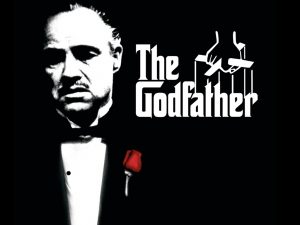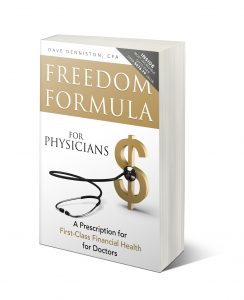There’s a revolution happening for physicians.
Have you ever felt like you’ve been lied to? Like a supposed financial professional has taken advantage of you?
Maybe they’ve sold you some crazy expensive life insurance policy.
Or instead, maybe you know that your spending has been a bit out of control. You don’t have a budget and instead you have a mountain of credit card debt.
Or maybe instead… you have a mountain range of student debt. It’s 100k, 200k, 300k, or more…
Or, let’s say your debts are paid off and you are sick and tired of the taxes that you are paying. Yet, you don’t know who to turn to for advice.
There’s a financial education revolution happening. It’s led by a man who has empowered dozens of physicians.
It’s the revolution of the White Coat Investor.

My name is Dave Denniston, your host and welcome back to the latest episode of The Freedom Formula for Physicians Podcast.
Welcome back to our monthly fireside chat with a physician to get to know their journey, their joys, and their struggles with finances and outside of finances.
This show is not always about actionable content. It is however a chance for you to see behind the curtains, to walk in another person’s shoes and experience their lives.
Our next guest has not only been a physician, but is also a financial blogger and thought leader.
As a matter of fact, he has inspired over a dozen physicians to start their own blogs so that they could model his success.
A little bio on him… he is practicing, full-time, board-certified emergency physician just a few years out of residency. Although he’s always been interested in personal finance and investing, he really started diving into the field as a resident when he finally got sick of financial professionals ripping him off. In fact, most of his first few encounters with financial professionals ended badly for him.
So, that really sucks and I know many of us can relate to that. Unfortunately, doctors are a target. We’ll dive into that later.
I know he has a ton of wisdom to share with us and with no further adieu…
Please help me welcome Dr. Jim Dahle (pronunciation- DOLL-EE), THE White Coat Investor….

In this podcast, you will discover…
- Why Jim had virtually no exposure to financial education growing up
- The moment when he was growing up that provided motivation to be financially successful
- The financial lessons he is teaching his kids
- Why debt hasn’t played a role in his financial journey and the sacrifice of time he made instead
- How he built his empire and inspired dozens of physicians to be like him
- The 3 actions he is taking to drastically lower his income taxes
- His future plans for more books

Resources Mentioned In This Podcast
How Low Can You Go? A Podcast with Dr. Glen & Sharon Livington
The Freedom Formula for Physicians Podcast on Itunes
The Freedom Formula for Physicians
Disclosure: I receive a small ‘affiliate’ commission for books or other products I recommend when you buy them on Amazon.
TRANSCRIPT
Dave: My name is Dave Denniston, your host and welcome back to the latest episode of “The Freedom Formula for Physicians Podcast.”
Well, welcome back my friends, to our monthly “Fireside Chat” with a physician. To get to know their journey, their joys, and their struggles with finances and outside of finances. This show, is not always about actual content. It is, however, a chance for you to see behind the curtain. To walk in another person’s shoes. And to experience their lives. Well, our next guest, he has not only has been a physician,
He’s also a financial blogger. And a thought leader. And as a matter of fact, he has inspired over a dozen physicians to start their own blog. So that they can model his success. A little bio on him, he is a practicing full time, Board Certified an Emergency Physician. That is just a few years out of residency.
Although, he’s always been interested in personal finance. And investing. He has just recently diving into this field as a resident. When he finally got sick of so many financial professionals ripping him off. And in fact, most of his first few encounters with financial professionals ended badly for him. So that sucks! And I know many of us can relate to that. And fortunately, doctors are targets. So, well, dive into that a little bit later. But I know he has a ton of wisdom to share with us. And with no further ado, please help me welcome Dr. Jim Dahle, the white coat investor, welcome Jim.

Jim: Thank you very much, glad to be here.
Dave: Well Jim, I am so glad you are with us to share with us your wisdom and your journey. I know it’s been quite a ride with you so far, with the side hustle that you’ve had going. And I’ve heard financial knowledge, it wasn’t always something that was important to you. However, before we get going into that? Take a step back with us to the past. Let’s step in with you for a moment. First, tell us more about you? Where did you grow-up, and what was your childhood like?
Jim: Well, I actually grew-up in Alaska, in Anchorage. I spent the first 18 years of my life there. Almost never left the state. I’m one of six kids, I’m the third one. And I had a fairly ideal childhood. My parents stayed together. My mother was a stay-at-home mom. My dad was an engineer, and a bush pilot on the side. And we grew-up in a beautiful place, with a lot roots, surrounded by really good people. Anchorage is a town of about 300,000. So, it’s big enough to have one of everything. And you know, the other Alaskans joked that Anchorage is just 10 minutes from Alaska. But it turned out to be a really great place to grow-up for me.
Dave: Now, is that a place where, there’s a lot of outside, outdoor activities? I’ve personally never been to Alaska? I’m sure it’s a place that a lot of our listeners haven’t been to either. So, is this a very community oriented place? How is, would you describe it?

Jim: Well, Alaska is one of those places where you either leave after the first winter, or stay for the rest of your life. You know, it’s a very unique place. And if you don’t like the things that are unique about it? If they aren’t huge positives for you? They are rather huge negatives for you.
Living in the state will drive you out pretty quickly. You know, it’s cold, it’s dark, very isolated. It’s expensive to go anywhere else, you know. There aren’t any road trips available anywhere I guess? But in return for that, the summers are just bliss. The sun’s up all the time, the temperatures are perfect.
You know, you have gorgeous mountains rising out of the sea. In glaciers calving. And all kinds of wildlife. It’s really a beautiful place. But, if you’re not into outdoor activity? Well, you can see why it wouldn’t be a lot of fun. In fact, not only do you need an outdoor activity, you need one that you can do in the winter, because the winters long. You know, whether that’s riding the snow mobile, or whether that’s ice fishing, or Ice climbing, or whatever that might be? You’ve got to learn to enjoy something outside in the winter or you’ll just go nuts up there.
Dave: Yeah, I’ll bet. Well, what really strikes me, and I listen to you. That, it sounds like the kind of place that in itself it’s probably not too, expensive to live there. You have all this outdoor stuff. Is that a fair assessment?

Not quite Alaska, but the prices are the same!
Jim: Well, I mean, it’s a little bit more expensive. It’s kinda like Hawaii that way, it’s got to be flown in. And so, the cost of living is actually fairly high. But in general people get paid a little bit more to live up there. And so, they usually it works out even. It’s not Manhattan? But it certainly isn’t Indianapolis.
Dave: Yeah, I can see that. Well, with everything being so far away, in Alaska.
Jim: A-huh.
Dave: Well, in this Podcast, we focus on finances and it’s just so fascinating to me. To see, what shaped, and molded, perceptions around money? Now, what about you Jim, what’s been some of your biggest influences related to money?
Jim: Well, I don’t know I have any a lot of influences related to money when I was growing-up? I mean, when I think the only real influence you get? Is from your parents, your parent’s example. And, you know, my parents, my dad was working for the state. And so, he had a pension come to him.
And that was the main form of retirement he expected from the job. He had the whole time I was at school. So, I don’t know if there was a ton of retirement savings going on? I do remember one time? When we were out of money.
They sat us down and told us, but that was, you know, for a couple of weeks, until the next pay check came in. You know, we never went hungry or anything like that. We lived in a, I think the house was 2200 sqft. nice neighborhood, went to nice schools. So, I certainly didn’t suffer in anyway. It was a middle class, maybe slightly upper middle class lifestyle. Despite having six kids in the house. But, I don’t know I had a huge influence with regard to money, at that stage in my life.
Maybe a bigger influence was when I left to college, and we knew the deal. We were expected and encouraged to go to college. But, there wasn’t much coming from our parents. They would fly us home for the holidays and for the summer, and that was about it. And so, my siblings and I, we either worked to pay for school, or we got scholarships, or we took out student loans. I think most of the influences for all of us, as far as money. Comes from those few years, when basically we were on our own, without much of an income. I think that had a much greater influence on me, as far as my financial habits.

Dave: Hum, it sounds like, let me know if I capture this right? That learning about money. It wasn’t something that wasn’t a regular part of your life? It really sounds like, you really learned a lot once you started earning money. But it wasn’t something that came easily in your family. So, you had to learn a lot about money, as you went along.
Jim: That’s exactly right. I mean, there really wasn’t any, like, conversations about money with my parents by any means. But, you know, there’s nothing quite like,
“The School of Hard Knocks!” And I certainly learned a lot, as soon as I got out of the house. I really didn’t have much interest, however, in finance or investing. And all the way into medical school. It just wasn’t something that was very interesting to me. I was always interested in, like most doctors, I was interested in science. And so, that’s what I majored in college. And that’s what I focused on, and wasn’t paying attention in any of my room mates that hadn’t, or were more interested in business. Which in retrospect, made me, maybe I should have a little bit more formal training because I ended up having to teach myself a lot of that later.
Dave: Well, here you are, in medicine now. As you grew-up, did you know, you always wanted to be in medicine? How did that start for you?

Jim: You know, you take those surveys in Jr. High, of what career you think would be good for ya? And, you know, no surprise. Medicine was on the list for me. But I don’t think I actually completely admitted to it, till my third year in college. I can remember a conversation on the phone with my dad saying, ya know, I’m going to medical school. I’ll be 31 before I ever get out of training. And he told me, you’re going to be 31, you know, at that point in time? Whether you go into Medical School or residency or not! You know, he just had the prospective that 31 was a very young age, not an old age. And a time for me, I think, I was 22, or 23; 31 just seemed older than dirt. And so, he really gave me some perspective. And that is when I committed to it. Just in time for most study for the M-CAT, and applied to medical school.
Dave: So, now you’re in the place, you’ve gone to Medical School, you’re going through residency. And I think in your case, you’re in the military of some sort?
Jim: Well, I had a, the way the military scholarship that I went to school on, works is? You basically sign-up and become a Commissioned Officer at the start of Medical School. And then you go to Medical School, and they give you a stipend each month, and pay all your tuition and fees. And then at the end of Medical School, you got to go through the military match. And most of the time, you end up being matched into a military residency. Then after your military residency, you owe them a year for the year that they paid for Medical School. So, if they paid for 3 years? You owe them 3 years, they paid for 4 years, you owe them 4 years.
And so, that’s how I paid for Medical School. In retrospect, you know, it’s a debt one way or the other, whether it’s time, or money. I actually ran the numbers one time, and the military got me for quite a good deal.
Dave: So, what do you think, was it, 4 years? Including under-grad? And then Medical School, afterwards? What was it?
Jim: Nah, they paid, for 4 years of Medical School. I paid for under-graduate school by working through for the most part. As well as a tuition scholarship that I had. I had a very, very, small student loan, from my first year of under-graduate, it was about $5,000.00. When I taut to medical students, the terms of that loan, they can’t believe it, it’s such a great loan. You know, it’s not available anymore.
Dave: Well, back then you could shop around a whole bunch of different companies easily during your under-grad.
 Jim: Well, this one was even better, it was from the state of Alaska. And they allowed you to defer the interest while you were an under-graduate for medical student for a resident, and in the military. So, I ended up paying it back 17 years later, without ever having paid interest on it? So, it was rather a good deal from a loan. I don’t think the state of Alaska is doing that anymore?
Jim: Well, this one was even better, it was from the state of Alaska. And they allowed you to defer the interest while you were an under-graduate for medical student for a resident, and in the military. So, I ended up paying it back 17 years later, without ever having paid interest on it? So, it was rather a good deal from a loan. I don’t think the state of Alaska is doing that anymore?
Dave: (Laughing) I’m sure they learned that lesson.
Jim: That’s right, and basically I borrowed $5000.00 and paid back $3000.00. Once you let the effects of inflation.
Dave: Well, it sounds like on your side, that you paid, with time, rather than with money. And so, debt wasn’t really a big part of your journey. But, outside of Medical School debt. Was there ever a time you just struggled with any kind of credit card debt as you went along in your journey? Or were you just paying for everything in cash? What was that like for you?
Jim: Well, I mean, first of all, I think there’s this miss-perception that, whether it’s military service or health service, or whatever? That there’s no debt there. And that it must be a great idea. And I don’t think that’s necessarily true. I mean, in many ways, I did have a debt. I had no choice what so ever about my job! When I came out of residency. I had no choice about where I was going to live, or about what I was going to do. Or how many shifts a month I was going to do, or when I was going to work? Or what continent I was going to be practicing on.
And so, in many ways, my debt was a time debt, not a money debt. And you know, as I look back on it? Especially because I went to the University of Utah, when tuition really wasn’t very expensive. I probably could have been out of debt within a year. Coming out of residency. But instead I spent four years of time. And so, I certainly was affected a great deal, and my career had a great effect on it because of that debt. The military wasn’t all bad. A lot of good things about it. But there obviously was some debt involved. You know, as an under-graduate, I wasn’t living on very much money. I had either 3 or 5 room-mates the whole way through. And was donating plasma for food money, I was barely scraping by. My transportation was a bicycle, I busted my butt all summer to make as much money as I could.
Then I would divide it by 8, and that’s what I had to live on for the rest of the year, until I could get summer job again. So, I think that period of time, those years of my life, really taught me to live off of very little. And realize, I don’t need a lot to get by. And some, they are pretty formative financially formed me. But, I remember at the end of it. One of the reasons that I signed up with the military. Is, I was sick of being dirt poor. And they were offering me $900.00 a month stipend. And that just seemed like a ton. And so, I was excited to sign-up with them for that reason.

Dave: Hum, it really sounds like, that time. I’m just thinking back to, you were back with your parents. And that one or two weeks, where you had no money. And there was that influence of feeling like you were dirt poor. It sounds like it really impacted your life. And as you started to be smart with money. That you had that in the back of your mind. And you had no credit card debt through this whole process. You were making it on a meager income.
Jim: That’s right, I never really considered borrowing at that point in my life? I basically looked at here’s what I’m making, here’s what I’ll spend. I’m not sure, whether if that was my overall, I don’t know, anti-debt feeling. Or why I lived like that? I don’t know, that’s just the way it was.
Dave: For people who maybe didn’t grow-up that way. There’s a lot of physicians listening to us right now. And perhaps they came from a solid great family. And they are not used to having to live on meager means? And living like a resident, as we hear it said? And I hear it’s a lot harder for us to step down our living expenses. And the comparison, easy to just step them up. And I want to talk about that, for a little bit. How different people are brought up and how some physicians really just struggle in that process.
 Jim: Yeah. It’s difficult for people to look at how others are living and brought up. And understand them that way. But there is no doubt those early influences can affect us. And can how we end up living our lives. And I think it’s hard for people to learn to be really frugal if they have never been forced to do it. In fact, I worry a little bit about my kids that way. They, then try and teach them that way as we go along.
Jim: Yeah. It’s difficult for people to look at how others are living and brought up. And understand them that way. But there is no doubt those early influences can affect us. And can how we end up living our lives. And I think it’s hard for people to learn to be really frugal if they have never been forced to do it. In fact, I worry a little bit about my kids that way. They, then try and teach them that way as we go along.
Because the are really not going to struggle for money, like I did. And so, it’s almost unofficially create that a little bit. Like, I was at the story with my son, last night. And he wanted to buy a rubber band gun. But, he hadn’t brought his wallet. He had the $16.00, to go to the cost. But he entered a hole, he wanted to borrow from me, so he could buy the rubber band gun last night. Rather than having to go back to the story later. And I told him I wouldn’t loan it to him. Now, obviously I had the $16.00, I’m trying to teach him a lesson there. Now I don’t know how well that works, teaching that sort of thing artificially, but I’m sure trying.
Dave: Now, one of the things I’ve heard, from another Podcast guest, Glenn Livingston. He talked about the habit of work. That getting used to the habit of working, is something that he has been working for a lot of people. A lot of families that working kids early, having to actually earn money, seems to have a strong correlation to an appreciation of that money, how about you, do you agree with that?
Jim: I think that’s absolutely true. You know, I’m constantly quizzing my kids, where does money come from? And they’ll answer? It comes from work, you know.
They got that one down, there’s no doubt about it. I like to think of myself as a little bit inherently lazy. I bet if you ask my parents, they’ll say the same thing. So, I’m not sure exactly, where I learned to work so hard? But, it must have been at some point as an under-graduate.

Dave: Now, outside of debt, which is something that you talk about, and I talk about a ton on the Podcast. When you think of preparing for retirement? What sort of problems are costing physicians, your friends, your colleagues? The most money right now?
Jim: Well, I think there is a few things, one is their lifestyle, or simply spending too much. You know, in that regard, doctors are not any different in that they are American. You know, the savings rates are fairly atrocious, people start celebrating that they are positive, or that they hit 4%-5%. But in reality, most doctors need to be saving something like 20% of their income just for retirement. And so, that’s probably the main issue, is that they spend too much, and don’t save enough.
Another issue for physicians, is they aren’t, tend to be targeted by the financial industry. And maybe get hit by higher fees, than maybe some other people do. And so, a lot of their money goes to investing expenses, as well as taxes. And so those are, I think, the really big opponents of physicians have when it comes to building wealth. It’s their own desire to spend. The fact that they are highly taxed. And the fact that they are financially industry prays on them a bit with fees.
Dave: Now, speaking of high fees, and full disclosure. You are the white coat of investor. And I was a former advertiser on this site. But, it got too expensive. As the site blew-up.
Jim: Yeah, that’s one of those things we looked at. And said, well, we got people knocking down our door to advertise. I’m not sure how to choose who we should as an advertiser. Other than to raise prices until we see who it’s worth it to stick around. And so, I’m sorry about that, but I’m, unfortunately that’s a reality of a business like this.
Dave: Well hey, it’s capitalism, right? I don’t want to pay that much to me. But anyhow, I mean, one of the biggest forms of flattery is, “Imitation.” And it’s one of the things I really want to touch on here. You, you have inspired many physicians to start a side hustle, a blog, a Podcast. And they are looking to your success and they want to do it too. They want to do what you do. So, those that are thinking about it? Maybe those that are already doing about doing it? What do you think are the biggest keys to success that you’ve had with your blog?

How to Have Success on a Blog and Laugh All the Way to the Bank (Like This Guy!)
Jim: Well, I think the biggest, the other few keys to success. Number one, it helps out those first. You know, I saw a big meeting the docs just now getting this information. And I could see this huge pitch, completely unfilled. And so, I stepped into a pond that basically didn’t have any predators in it. And so, that made it really easy in the beginning because I was basically the first one in there.
But, the thing that really made a difference is, a sense of mission. You know, the mission of the website, was to help docs get a fair shake on Wallstreet. Or help those that wear the coat, get a fair shake. And that really was the reason why I did it. You know, I didn’t make any money that first year, I think I made $936.00, and a wrote it all off. And even the second year, I only made something like, $5000.00. So, as a business, I was spending way more time than I was getting paid for, there was no doubt about it. And I had no idea that it was ever going to do so well financially. And so, while I started as a business.
One, I wanted to learn about getting past of income and that sort of thing. What really drove me to do? What really kept me going? And put me in all those hours. Is, I really wanted to help other people, other docs in similar high income professionals get a fair shake. And so, without that sense of submission, the goal is? Just to have a side hustle to just make a little money on the side. You know, I’ve seen a lot of blogs come and go that are trying to do the same thing. And they realize that you really got to have a passion for this stuff, or you won’t last long enough to make any money.
Dave: Well, I think more than anything Jim, I mean, for me, it’s, these conversations that you have with your audience. It’s like, people feel like, you have all this awesome knowledge to bring. That you are, maybe bring some entertainment. But more than anything, yet your audience is feeling heard. They feel like they know you, know that you’re going to listen to them.
And maybe they even want you to manage their money. Because you know their problems and know what they’re going through. And I think to me, the absolute, that’s a huge key to success. And blogs and Podcasts, and frankly I hope I’m touching on this same kind of feeling for folks. And maybe there is somebody listening right now. And they haven’t had much of a business education. So, I’d like to let them behind the curtain a little bit. To understand the business side of running a blog or a Podcast. Now I know both you and I follow both,

What It’s Like To Run a Blog & Work a Regular Gig. Stuff catches on fire!
“Pat Flynn’s Smart Passive Income Podcast.” And John Dumas’s “Eon Fire” and those guys publish income reports every month. As a matter of fact, I encourage everyone to check those out. Learn how this stuff works, how money is made. And I think there is a stark difference between those two? And maybe even what you’re doing, and what they are doing? And when I checked out Pat’s Podcast. And he is doing a ton of affiliated deals. The huge vast part of his income is from affiliated income. Which frankly I was pretty shocked by. Now, by comparison,
John Lee Dumas – “E On Fire”, seems to make most of his money through self-produced information products, or SAS, which is, Software as a Service. My perception is that, in your case, the majority of income from your blog is through advertising now. I don’t know if that’s true or not? But, I’d like you to tell us a little bit about these business models. What is an affiliate? For those who may not know? And why have you set-up the blog financially the way that you have?
Jim: Well, I mean, it’s set-up, you know, business wise, the way that it is because. It’s what seems to work for me. I mean, it’s purely an empirical and practical reason. Whatever seemed to bring in the most money, that’s what we did. If we found something that was better, we swapped it out? And so, the model we use, we, you know, gradually worked out way to. Over the course of four years.
And you know, we’re constantly searching for new lines of revenue. And so, as a business. It’s hard to say, what someone else ought to be. Because of different model might work for them. You’re in a different niche, or if you’re trying to do something similar? You know, you may use a totally different business model, and find success with it. And not find success in that business model.
So, I wouldn’t necessarily say that you have to do exactly what I’m doing? There’s a lot of different ways to make money on the internet? In many ways, the internet is the wild west of the entrepreneurialship. Or just about anything goes. And if it doesn’t go, you can change your business to another company or country and it will go there, you know. And so, you can really do anything you want and only really limited by your own morals. The way we are set-up right now is? You have some affiliated income, and we have some direct advertising. We use some ad serving from like Google Ad Sense.
And then we get some things like book royalties coming in. And fees for writing for other publication. And fees for, you know, speaking gigs and that sort of thing. There’s a lot of various sources of revenue that come into the site. I guess if I had to look at the big sources, it’s about a quarter of it affiliated income, about a half, direct ad sales, and the other quarter is mostly book royalties. The book continues to sell, month after month, after month. It’s probably been the best source of passive income at this point, that I’ve ever had. I’ve been amazed that most books, the sales numbers go down over the first six months. And continue to plummet after that. But in reality, I was more books a year after publication, was the first month after publication. And so, that’s been really pleasing to see that book continue to sell.
Dave: So, tell us about the book a little bit? What is the book about? What’s in it? And what can people expect to see?
Jim: Sure. The book has the same type material as the website, it’s called,
“The White Coat Investor” It’s a doctor’s guide to personal finance and invest. And the book, I was encouraged to write the book by blog readers. They said, you know, package some of the things and stuff from the book and write a books. And I wish I had done it 2 years earlier. Now that I’ve seen how well it sells. But partly, the reason why the book is selling so successful? Is I include a lot of my own personal stories in it. Not, I talk about how we basically became millionaires, 7 years out of residency.
And how what we did really isn’t that difficult. You know, it didn’t even involve any, you know, start-ups. Or anything difficult, all I did was carve out a big chunk of our income, and invest it in boring investments. And so, people find that interesting and inspiring the fact that. They had a look behind the curtain of our lives. There’s so few positions even, talk about money? To actually get one that was shared with you that was financially, financial side of life. I think means a lot. And then the remainder of the book?
Mostly takes people’s stage by stage, through the medical career. And talks about how they can optimize their finances. And so, I think people find that to be really helpful. It takes a lot of the information in the blog and puts it into a very readable format. So, you can kind of catch-up the long term readers all at once. Another reason why that book is so successful, though, has little to do with me? And everything to do with blogging. After I wrote that book? I sent it out to about 20 readers, and got a ton of feedback.
I basically wound up re-writing the whole book, making it about a third longer. And it’s a dramatically better book, than the original one I wrote. And so, in many ways, it’s kind of a crowd source book. It’s got stories from other people in it. It has tons of improvements in it. That were suggestions from regular viewers, and blog readers. And I think that made a big difference, in having quality product out there. Outside of being personally published.

Image courtesy of shutterstock
Dave: Now, I want to point this out. I want to emphasize to everyone that is thinking about having some sort of product? Pat Flynn’s – “Passive Income”, talks about testing. And as you think about online businesses doing micro-testing. What Jim set-up here? He’s setting up 20 of his readers, out there to him to improve it. And it made it so much better of a product. I am guessing that, Jim, you are even testing poser, and even things like that.
Jim: You know, I should do more, testing to be honest with ya. There’s a lot of things I could do to try and optimize the revenue from the site. But, every time I, you know, a limited amount of time. And when I look at the main mission of this site.
It’s time to get this information to as many people as I can. So, that’s where I try to spend my time. Rather than trying to tweak every dollar out of my current business model. You know, if you just provide as much value as you can, to as many people as you can reach? The money seems to come after it. No matter how well you’re optimizing it. Maybe someday I can spend more time trying to, you know, AB Test, do that sort of thing to try and see what’s available. The very best way to send out an Emails and the very best way to write a post. But, for now I just try and concentrate on helping as many people as I can.
Dave: So, with all this that you have going on? And I’ve heard you on a number of different interviews. One thing I have never heard you talk about is? The fact that many physicians, and you being one of them. Have to pay Uncle Sam, more and, more, and more. Can you share with us, for a moment, how have taxes been part of this journey for you? And what have you been doing to help get your taxes lower?
Jim: Well, I think taxes are a big issue for most docs. And we’re, the reason why is? Their income tends to be impressed into a real relatively number of years. You know, it’s a high income. But, you may not start getting it until your 35? And so, with that progressive tax system, you can lose an awful lot of what you earned at taxes. Especially not doing all you can to lower those taxes.
Probably the biggest tax break I enjoy, is tax deferred retirement accounts. And it’s nice that I am not only got a good plan with my medical partnership. You know, we have it, a 401K Profit Share Savings Plan, that I can put in $53,000.00 in every year. We also have to Define Benefits Cash Balance Plan. Which allows me to shoot off another $35,000.00. In addition to that, my wife and I both work her at “The White Coat Investor.” And we have an Individual 401K here. Which allows us each to shelter another $53,000.00 a year.
And so, that is a huge, tax break, to be able to take that off of the top of our earned income. And not only save it for retirement, protect it from predators. But just to not pay taxes on it. So, that saves us a ton of money on our taxes, that’s big. And another big thing is, just to realize just how the tax code works. You know, I spent some time early in my career, reading books, and learning about the tax code, and doing my own taxes. Just to get a sense of what the rules are, and what Uncle Sam wants to subsidize in my life? And by living your life in accordance with what Uncle Sam wants?
You can knock quite a bit of money off your tax bill as well. And so, I think, taxes are important, and there are a lot of things a physicians can do to decrease their tax burden. But, for the most part, they’ll, those aren’t accounting tricks. They require you to live your financial life differently. But, if you do so, the tax rewards can be significant.
Dave: Well alright. It sounds like six figures you’ve been able to sock away. You’ve been blessed in this position to do that. And obviously you’re not having enough to pay taxes on that today. But, what do you make of the ROTH verses additional IRA vehicles?
Jim: Well, I mean, as far as IRA’s go? They, there’s no argument at all. Because the only option is a back door Roth IRA, for the typical attending physician. To where as they can’t deduct the traditional IRA from contribution. And they can’t make a direct Roth IRA contribution. So, the only thing really comparing is you using a taxable account, or using a back-door-Roth IRA. So, that issue is, a non-issue for most docs, as long as you don’t have some huge IRA out there sitting around. Preventing you from doing a back-door-Roth IRA. Due to the Pro-Rata Rule. Back-door-Roth IRA’s is the way to go. On a more general topic of tax deferred contributions, verse Roth contributions? Such as in a 401K, it’s a little bit more of a new walls solution. But in general, you’re in your low-income years. Such as being a resident, or doing some military service, or a year where you have a sabbatical. Or if you are part time, or an early retirement. And you start getting social security. Those are the years to be doing it, Roth contributions, and Roth Conversions, even 401K’s. But for the most part, during your peak earnings years, it’s all about the tax deferred contributions. In fact, the less you save. The larger the benefit you’ll see from it, tax deferred contribution.
Dave: So, I think what’s an interesting choice now a days. Is, once you hit 70 ½, you have to take out a required minimum distribution. And then when you have a ton of money, that you took a tax deduction for? Unless it’s an IRA, 401K, Cash Balance Plan. You have to start taking money out of that. And what I think is a lot of physicians may not realize, is that, the more money you put away there. To get a tax deduction today, you’re going to have to, literally going to have to take out that money, later. Verses the ones that will come out tax free. And it might make more sense to, for folks to put away more money in a Roth 402K, than a traditional 401K. What do you think about that?
Jim: Well I think that’s a wonderful problem to have. I hope all doctors can end up with that problem. A much more common problem, is you just haven’t saved enough. When I talked to doctors in their 50’s. and 60’s, and the size of their retirement tax deferred accounts? By then most of them have rolled their 401K’s into an IRA. And they are doing well if they’ve got a $1, or $2 million-dollar IRA. Now, the required distribution at age 70, is less than 4%. So, if you only have a $1 or $2 million-dollar IRA? That’s only $40 to $80 in taxable income. That certainly isn’t going to push anybody into the highest brackets. And so, for you to have a required minimum distribution problem? You’ve got to be a super-saver, your whole career. And we’re talking about getting your IRA to the $5 to $10 to $15 millions size. And for the most part, people just don’t save enough. Their plans don’t allow them to save enough. And they don’t a good enough return. To really have an issue where they are being pushed into higher brackets in retirement, than they are during their main career. And if you’re such a super-saver, that’s going to become a issue for you? Than sure, do some Roth 401K contributions along the way. But, when people really understand just how much of an I and D they have to have to push them into the brackets they were in, in their work, working years? It just becomes a non-issue for the vast majority of high-income professionals. They simply have not saved enough money to have that problem.
Dave: Well yeah, I think that is a great point. And I think it takes us back to the beginning. So, how is your lifestyle? How are you, my listener, structuring that? For example, do you want to work, longer to maintain a lifestyle? Or, do you want to save more now, and sacrifice now, to retire at an earlier age. Well, for you Jim, obviously, you have enough that you could retire if you wanted to? You could step away from medicine if you wanted to. Now, let me just say, for me personally, that you have inspired me. To find the time to be a practicing physician, and running this blog, that’s like two full time jobs. And that just blows my mind, and amazes me. You are doing something really special. So, out of the bottom of my heart, thank you, thank you for all you’re doing Jim. And tell us a little bit more about the blog, and your future plans.
Jim: Sure, I’m always trying to implement, and innovate new things. No, we have a, I’m bringing the book out in an audio book format in the next month or so. And so, that’s really exciting to do. I also have plans for a couple of new books. I was able to cut back my clinical time, from full time to 3 quarter time, about a month ago. And so, I’m hoping that will free up some time to write those books that I currently just have in sketch format. And so, that will be another, you know, addition, I think to what’s available out there for docs. But, for the most part, I continue to just try to get the basic message of the white coat investor. Which is one of increasing financial literacy among physicians. Out to as many people as I can. You know, it’s interesting I talk about these other blogs. Some are kind of Me2 blogs, are trying to do something similar to what I am doing. And people think that’s competition for me. But, in reality they are helping to full fill my mission. Which is increase the final financial literacy among doctors. And so, in many ways they’re helping me to do my work. So, I’m very grateful for that. If more people want to copy what I’m doing, that would be wonderful.
Dave: So, you’re kinda like, “The God Father” ,“The God Father of Physicians, Blogging.” So you can start acting like Marlin Brando?

Jim Dahle, The Godfather of Physician Finance. He’ll ice whole life policies!
Jim: That’s right, just start icing people like, I guess?
Dave: Well, you have been absolutely at this for a while right? You have a ton of blog posts right? So, to someone who is brand new to your blog? They’ve just wandered onto the web, They are looking at your website right now. Obviously you have the address for a number of years. You have a ton of posts. What are some of the best post you think the folks should check out?
Jim: There is a section they should check out, called, “Classics.” And so, you can go on there, and just on the home page. And there will be a list of classic posts. And I think those are the ones have maybe effected people the most over the years. For example, I have a five-part post, on the five myths of Whole Life Insurance. It seems that every doctor whether he already owns one. Or had one propositioned to him? And the guys who sell them, boy! Do they work hard. Trying to get you to buy a Whole Life Insurance Policy. And so, it’s a chance for docs to understand what’s going on behind the scenes. How the policy really works. And maybe the methods used by the insurance agents to sell them to you. So, I think that helps a lot of people out, to help to understand that part of that product. Other posts that are pretty popular in my backdoor IRA Tutorial. A lot of people have heard the name. But not really sure how to do it. And this will take you step-by-step, including the tax form. How to fill it out.
Tax door, we usually do a back door IRA. Another popular post, is about the rules for multiple 401K’s. Some doctors don’t realize they can have more than one 401K if they have unrelated employers. And so, that’s a very popular post on the site. My annual tax reports, where I talk about how much I am paying in taxes for some reason are also popular, not entirely sure why. I guess people really like having a glimpse behind the curtain there.
Dave: Well, thank you so much, for sharing that. And as we wrap up this interview, I would like you ponder this question for a moment. Let’s take a step back into the past. You’re not a practicing physician, you’re not even a resident, you’re in Medical School. If you could sit down with a younger Jim? A Jim that’s about to finish Medical School. What advice would you give to him?
Jim: You know, it’s interesting, I don’t have a real, regrets from that period of life. I’m still very grateful for the specialty I chose. I’m grateful for the residency I went to. At that point I was already committed to the military. I may have done that differently. But I think the main thing would be, to point out something. That your priorities in 10 or 15 years are going to be very different from what they are as a Medical Student. You’re going to care a little bit more about your lifestyle. You’re going to care a little bit more about your income. Your idea of what you want your life to look like, is going to be very different. And I think that’s probably going to be the case 10 or 15 years from now, for me. And so, it’s a fun journey to go through life and realize that your priorities and goals and ambitions gradually change. Like, for instance, I never would have imagined I would have spent as much time doing, “The White Coat Investor” back in Medical School.
Dave: Great advice, there is so much more on physicians that we simply don’t have time to cover. Do you have any closing thoughts, that you think folks should be aware of?
Jim: I think people, really need to concentrate on what their financial situation could be for them. Many ways, getting ahead along your finances can increase your happiness. But that’s only up to a certain point, beyond that point, more money is not going to make you more-happy. You know, lowering your taxes further isn’t going to make you anymore happy. And in the beginning, those activities are very high yield, not only for improving your financial situation? But, decreasing your stress, and increasing your happiness. And so, if you haven’t taken those beginning steps, get a handle on your financial situation. Really feel like you got planned for your financial future. Do it as soon as you can, it really can make a dramatic difference, in your personal life, to your career, and obviously in your finances.
Dave: Well, thanks so much for being with us Jim. If people have more questions? How can they get in contact with you?
Jim: The easiest way to find me is, just through the website. There’s a “Contact Me” page on “The White Coat Investor” dot com. www.thewhitecoatinvestor.com, I also take Emails at – editor@whitecoatinvestor.com
Dave: Well, thank you Jim and friends for being with us. And I would love to tell your story. It would be my honor to host you on the next Podcast. I know, there is so much we can learn from your journey. And it will help other doctors. After all, who better to speak to physicians than another physician. I think there is going to be some awesome stuff here, for us today. Well, make sure to contact me, dave@doctorfreedompodcast.com. For the
Freedom Formula for Physicians Podcast, this is Dave Denniston, remember my friends, remember to slash your debt, slash your taxes, live a liberated lifestyle. Also, if you gain some value out of this Podcast? I would be eternally grateful, if you could take 5 minutes to review it on ITunes, GooglePlay, so more and more physicians become aware of this Podcast. Well, thanks so much for joining us. Make sure to subscribe, check in again soon, have a good one.
Hey, this is Dave Denniston, your host, and I hope you liked Dave’s episode? If you do and you want some more ideas on finding financial freedom? I am personally committed to increasing your financial knowledge. And we talked today about a bunch of jargon you’ll hear tossed around. And so this month my friends, I have a very special offer for you.
Through the end of October, you can pick-up my book, “The Freedom Formula For Physicians” for only a $1.00.
 That’s right, the whole copy, the whole physical copy, that you can hold in your hands, for only $1.00. You can visit the website now at – www.doctorfreedompodcast.com/dollar, to pick-up your copy.
That’s right, the whole copy, the whole physical copy, that you can hold in your hands, for only $1.00. You can visit the website now at – www.doctorfreedompodcast.com/dollar, to pick-up your copy.
My friends, I simply ask you help to pick-up the cost of shipping and I’ll send it to ya.
So, don’t let this Podcast be like other ones where you get great information and you get new ideas. But you never actually go and complete anything? To snag your copy, now, visit – www.doctorfreedompodcast.com/dollar, again, that’s – www.doctorfreedompodcast.com/dollar.

[…] The Revolution of the White Coat Investor Podcast […]